Accounting Research: Internet Financial Reporting and Agency Theory
VerifiedAdded on 2020/05/08
|18
|3953
|166
Report
AI Summary
This report delves into various aspects of accounting research, examining internet financial reporting through case studies of Sri Lankan and Bangladeshi companies, analyzing their disclosure practices and sampling methods. It further explores agency theory, stewardship, and executive compensation, discussing the theory's assumptions, compensation packages, employee attitudes, and internal problems related to excessive executive pay. The report also challenges agency theory's assumptions and presents alternative approaches like resource-based theory and behavioral accounting. Finally, it reviews research in auditing, analyzing articles and discussing methodologies, hypotheses, and conclusions. The report offers a comprehensive overview of key concepts and research areas within the field of accounting, providing valuable insights into financial reporting, corporate governance, and auditing practices.
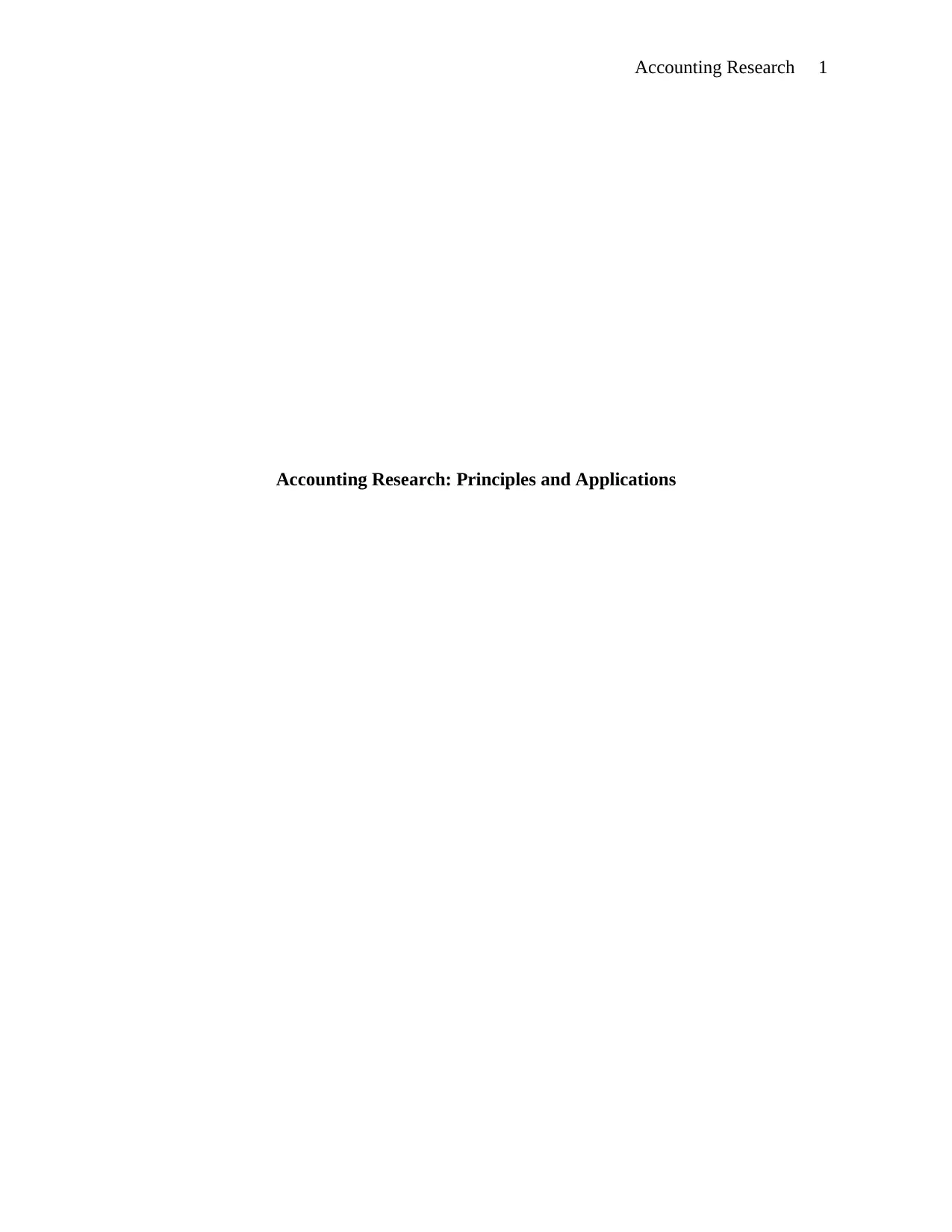
Accounting Research 1
Accounting Research: Principles and Applications
Accounting Research: Principles and Applications
Paraphrase This Document
Need a fresh take? Get an instant paraphrase of this document with our AI Paraphraser
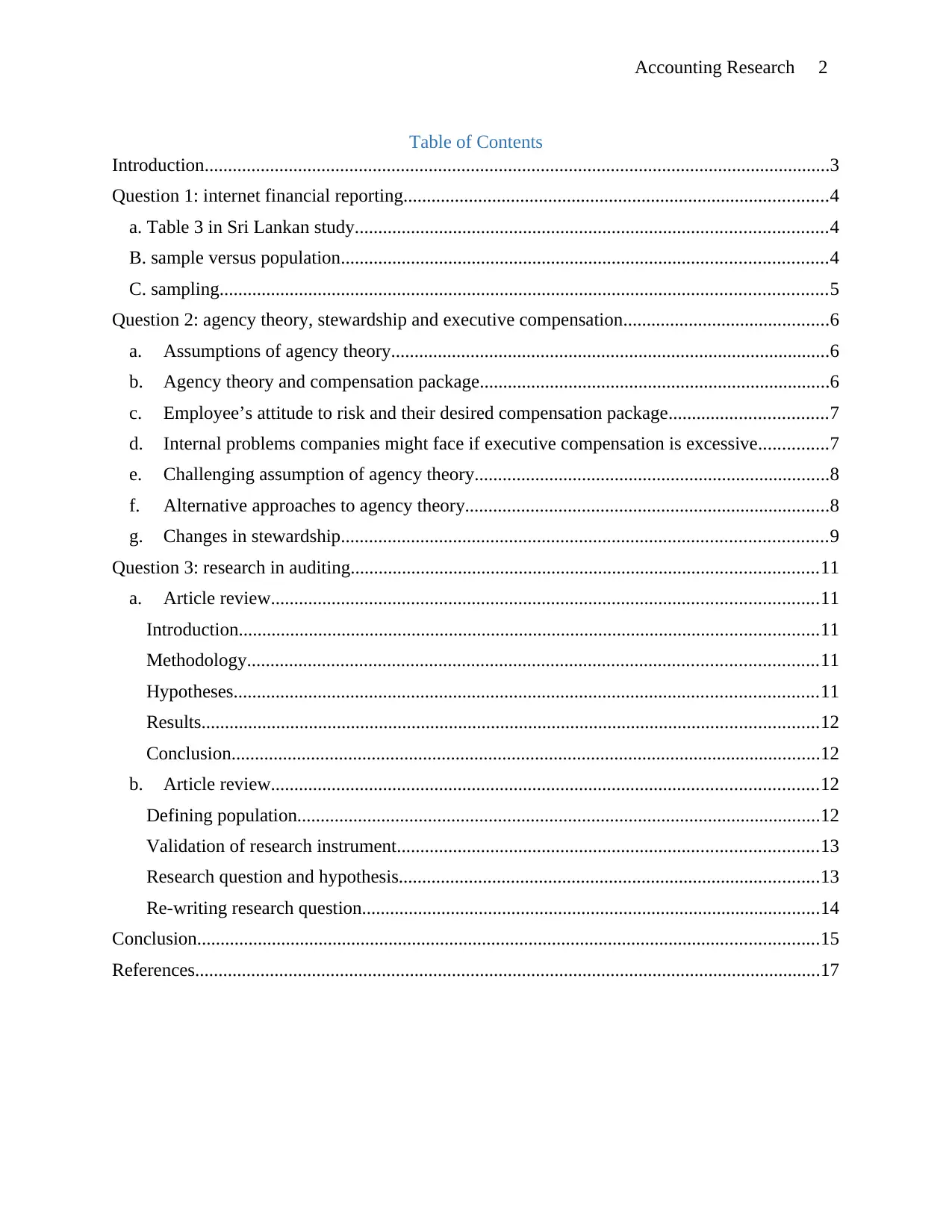
Accounting Research 2
Table of Contents
Introduction......................................................................................................................................3
Question 1: internet financial reporting...........................................................................................4
a. Table 3 in Sri Lankan study.....................................................................................................4
B. sample versus population........................................................................................................4
C. sampling..................................................................................................................................5
Question 2: agency theory, stewardship and executive compensation............................................6
a. Assumptions of agency theory..............................................................................................6
b. Agency theory and compensation package...........................................................................6
c. Employee’s attitude to risk and their desired compensation package..................................7
d. Internal problems companies might face if executive compensation is excessive...............7
e. Challenging assumption of agency theory............................................................................8
f. Alternative approaches to agency theory..............................................................................8
g. Changes in stewardship........................................................................................................9
Question 3: research in auditing....................................................................................................11
a. Article review.....................................................................................................................11
Introduction............................................................................................................................11
Methodology..........................................................................................................................11
Hypotheses.............................................................................................................................11
Results....................................................................................................................................12
Conclusion..............................................................................................................................12
b. Article review.....................................................................................................................12
Defining population................................................................................................................12
Validation of research instrument..........................................................................................13
Research question and hypothesis..........................................................................................13
Re-writing research question..................................................................................................14
Conclusion.....................................................................................................................................15
References......................................................................................................................................17
Table of Contents
Introduction......................................................................................................................................3
Question 1: internet financial reporting...........................................................................................4
a. Table 3 in Sri Lankan study.....................................................................................................4
B. sample versus population........................................................................................................4
C. sampling..................................................................................................................................5
Question 2: agency theory, stewardship and executive compensation............................................6
a. Assumptions of agency theory..............................................................................................6
b. Agency theory and compensation package...........................................................................6
c. Employee’s attitude to risk and their desired compensation package..................................7
d. Internal problems companies might face if executive compensation is excessive...............7
e. Challenging assumption of agency theory............................................................................8
f. Alternative approaches to agency theory..............................................................................8
g. Changes in stewardship........................................................................................................9
Question 3: research in auditing....................................................................................................11
a. Article review.....................................................................................................................11
Introduction............................................................................................................................11
Methodology..........................................................................................................................11
Hypotheses.............................................................................................................................11
Results....................................................................................................................................12
Conclusion..............................................................................................................................12
b. Article review.....................................................................................................................12
Defining population................................................................................................................12
Validation of research instrument..........................................................................................13
Research question and hypothesis..........................................................................................13
Re-writing research question..................................................................................................14
Conclusion.....................................................................................................................................15
References......................................................................................................................................17
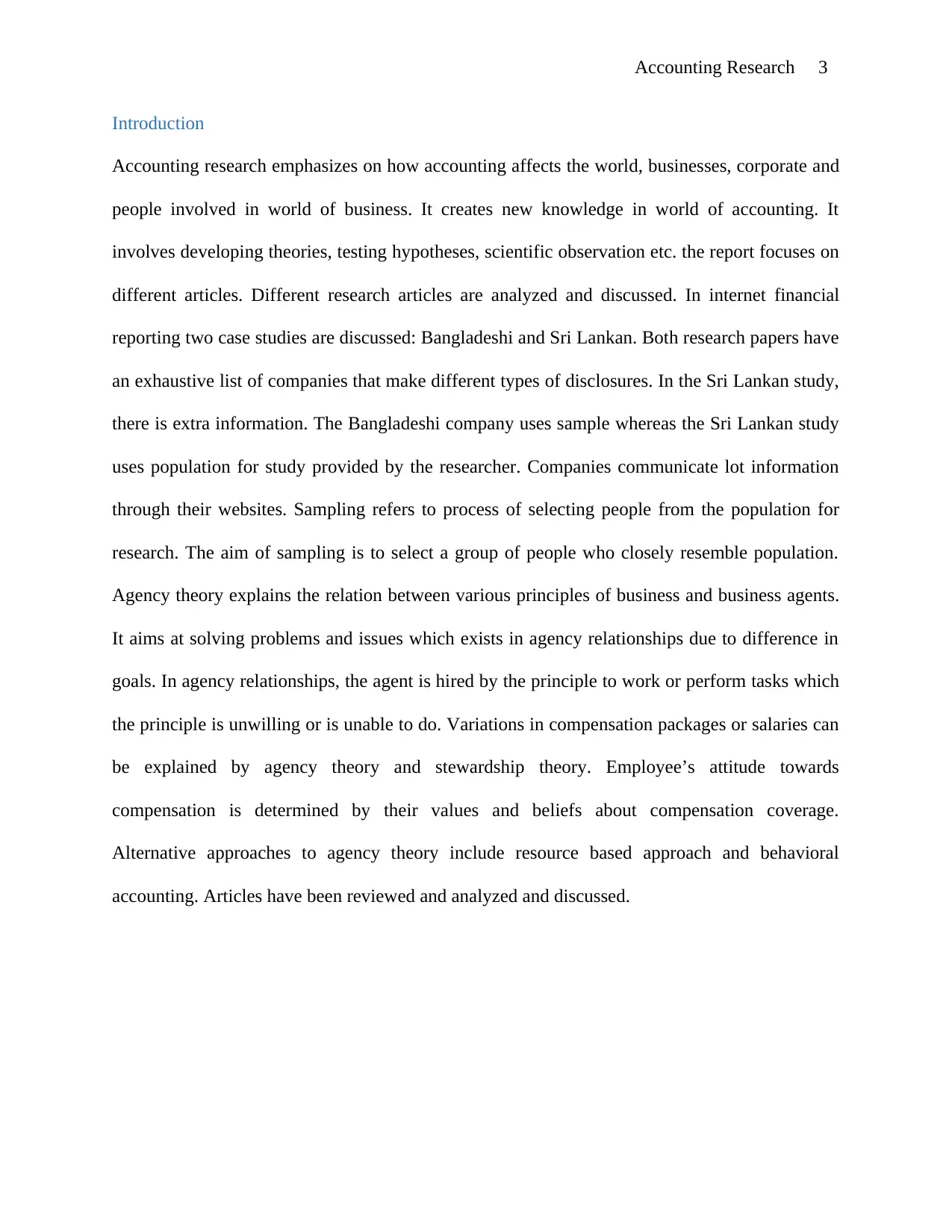
Accounting Research 3
Introduction
Accounting research emphasizes on how accounting affects the world, businesses, corporate and
people involved in world of business. It creates new knowledge in world of accounting. It
involves developing theories, testing hypotheses, scientific observation etc. the report focuses on
different articles. Different research articles are analyzed and discussed. In internet financial
reporting two case studies are discussed: Bangladeshi and Sri Lankan. Both research papers have
an exhaustive list of companies that make different types of disclosures. In the Sri Lankan study,
there is extra information. The Bangladeshi company uses sample whereas the Sri Lankan study
uses population for study provided by the researcher. Companies communicate lot information
through their websites. Sampling refers to process of selecting people from the population for
research. The aim of sampling is to select a group of people who closely resemble population.
Agency theory explains the relation between various principles of business and business agents.
It aims at solving problems and issues which exists in agency relationships due to difference in
goals. In agency relationships, the agent is hired by the principle to work or perform tasks which
the principle is unwilling or is unable to do. Variations in compensation packages or salaries can
be explained by agency theory and stewardship theory. Employee’s attitude towards
compensation is determined by their values and beliefs about compensation coverage.
Alternative approaches to agency theory include resource based approach and behavioral
accounting. Articles have been reviewed and analyzed and discussed.
Introduction
Accounting research emphasizes on how accounting affects the world, businesses, corporate and
people involved in world of business. It creates new knowledge in world of accounting. It
involves developing theories, testing hypotheses, scientific observation etc. the report focuses on
different articles. Different research articles are analyzed and discussed. In internet financial
reporting two case studies are discussed: Bangladeshi and Sri Lankan. Both research papers have
an exhaustive list of companies that make different types of disclosures. In the Sri Lankan study,
there is extra information. The Bangladeshi company uses sample whereas the Sri Lankan study
uses population for study provided by the researcher. Companies communicate lot information
through their websites. Sampling refers to process of selecting people from the population for
research. The aim of sampling is to select a group of people who closely resemble population.
Agency theory explains the relation between various principles of business and business agents.
It aims at solving problems and issues which exists in agency relationships due to difference in
goals. In agency relationships, the agent is hired by the principle to work or perform tasks which
the principle is unwilling or is unable to do. Variations in compensation packages or salaries can
be explained by agency theory and stewardship theory. Employee’s attitude towards
compensation is determined by their values and beliefs about compensation coverage.
Alternative approaches to agency theory include resource based approach and behavioral
accounting. Articles have been reviewed and analyzed and discussed.
⊘ This is a preview!⊘
Do you want full access?
Subscribe today to unlock all pages.

Trusted by 1+ million students worldwide
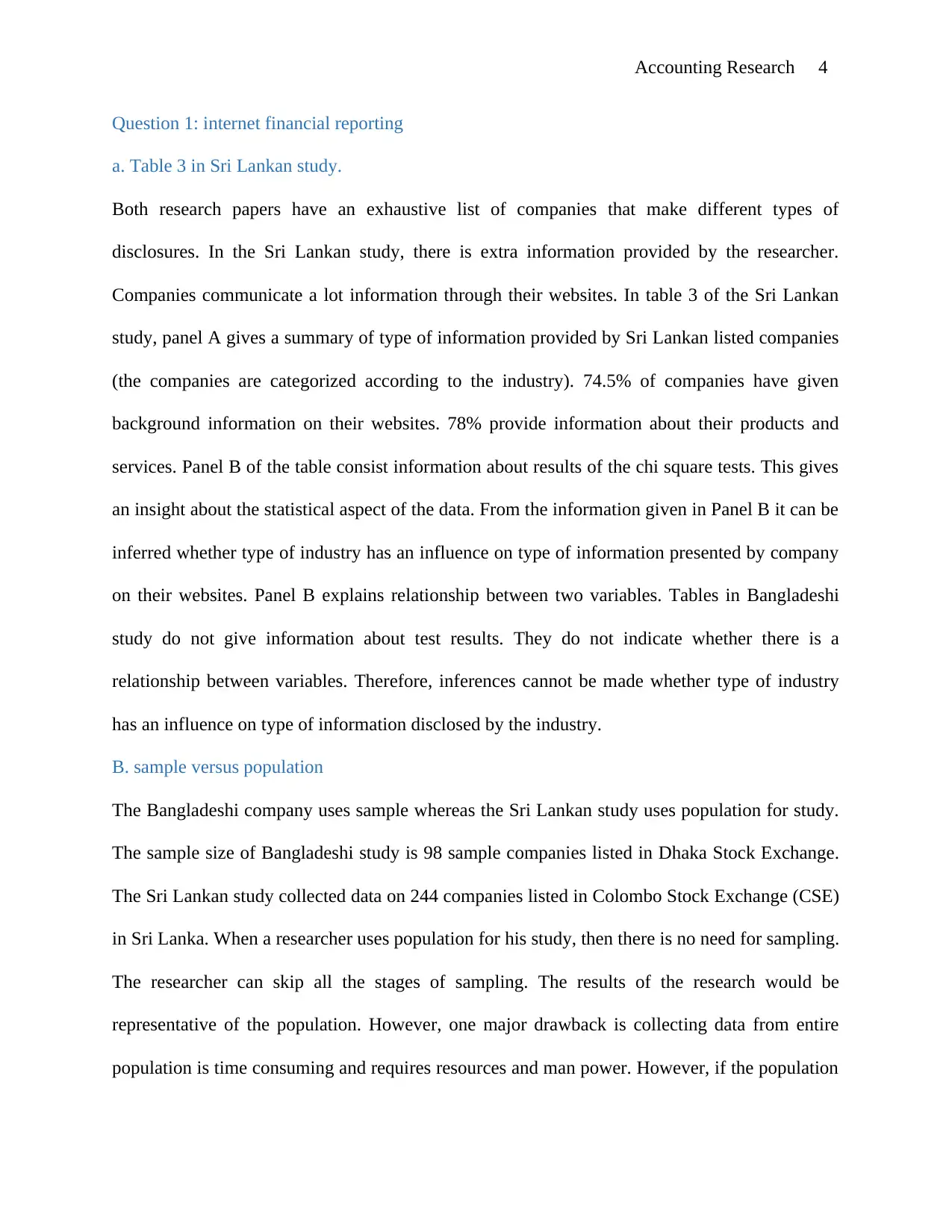
Accounting Research 4
Question 1: internet financial reporting
a. Table 3 in Sri Lankan study.
Both research papers have an exhaustive list of companies that make different types of
disclosures. In the Sri Lankan study, there is extra information provided by the researcher.
Companies communicate a lot information through their websites. In table 3 of the Sri Lankan
study, panel A gives a summary of type of information provided by Sri Lankan listed companies
(the companies are categorized according to the industry). 74.5% of companies have given
background information on their websites. 78% provide information about their products and
services. Panel B of the table consist information about results of the chi square tests. This gives
an insight about the statistical aspect of the data. From the information given in Panel B it can be
inferred whether type of industry has an influence on type of information presented by company
on their websites. Panel B explains relationship between two variables. Tables in Bangladeshi
study do not give information about test results. They do not indicate whether there is a
relationship between variables. Therefore, inferences cannot be made whether type of industry
has an influence on type of information disclosed by the industry.
B. sample versus population
The Bangladeshi company uses sample whereas the Sri Lankan study uses population for study.
The sample size of Bangladeshi study is 98 sample companies listed in Dhaka Stock Exchange.
The Sri Lankan study collected data on 244 companies listed in Colombo Stock Exchange (CSE)
in Sri Lanka. When a researcher uses population for his study, then there is no need for sampling.
The researcher can skip all the stages of sampling. The results of the research would be
representative of the population. However, one major drawback is collecting data from entire
population is time consuming and requires resources and man power. However, if the population
Question 1: internet financial reporting
a. Table 3 in Sri Lankan study.
Both research papers have an exhaustive list of companies that make different types of
disclosures. In the Sri Lankan study, there is extra information provided by the researcher.
Companies communicate a lot information through their websites. In table 3 of the Sri Lankan
study, panel A gives a summary of type of information provided by Sri Lankan listed companies
(the companies are categorized according to the industry). 74.5% of companies have given
background information on their websites. 78% provide information about their products and
services. Panel B of the table consist information about results of the chi square tests. This gives
an insight about the statistical aspect of the data. From the information given in Panel B it can be
inferred whether type of industry has an influence on type of information presented by company
on their websites. Panel B explains relationship between two variables. Tables in Bangladeshi
study do not give information about test results. They do not indicate whether there is a
relationship between variables. Therefore, inferences cannot be made whether type of industry
has an influence on type of information disclosed by the industry.
B. sample versus population
The Bangladeshi company uses sample whereas the Sri Lankan study uses population for study.
The sample size of Bangladeshi study is 98 sample companies listed in Dhaka Stock Exchange.
The Sri Lankan study collected data on 244 companies listed in Colombo Stock Exchange (CSE)
in Sri Lanka. When a researcher uses population for his study, then there is no need for sampling.
The researcher can skip all the stages of sampling. The results of the research would be
representative of the population. However, one major drawback is collecting data from entire
population is time consuming and requires resources and man power. However, if the population
Paraphrase This Document
Need a fresh take? Get an instant paraphrase of this document with our AI Paraphraser
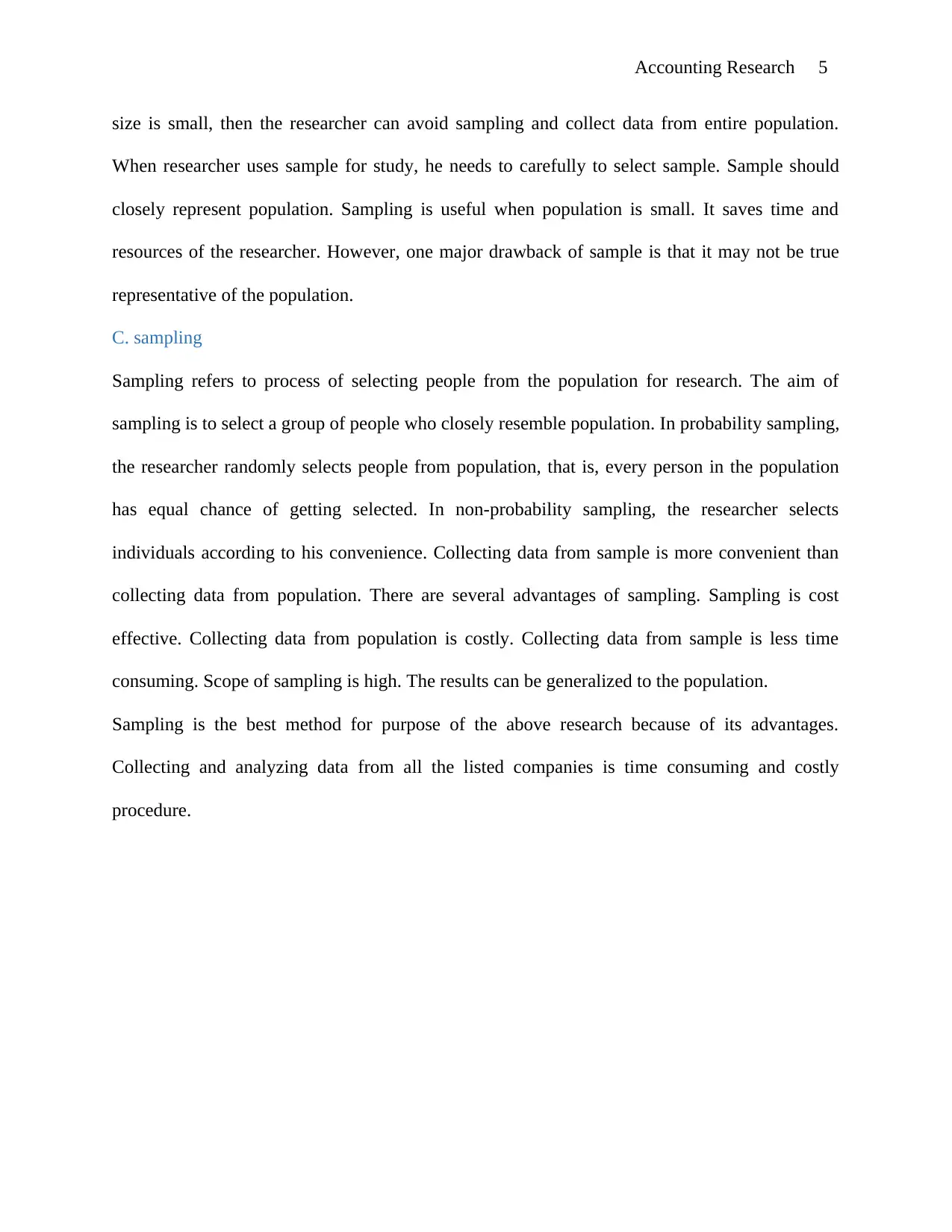
Accounting Research 5
size is small, then the researcher can avoid sampling and collect data from entire population.
When researcher uses sample for study, he needs to carefully to select sample. Sample should
closely represent population. Sampling is useful when population is small. It saves time and
resources of the researcher. However, one major drawback of sample is that it may not be true
representative of the population.
C. sampling
Sampling refers to process of selecting people from the population for research. The aim of
sampling is to select a group of people who closely resemble population. In probability sampling,
the researcher randomly selects people from population, that is, every person in the population
has equal chance of getting selected. In non-probability sampling, the researcher selects
individuals according to his convenience. Collecting data from sample is more convenient than
collecting data from population. There are several advantages of sampling. Sampling is cost
effective. Collecting data from population is costly. Collecting data from sample is less time
consuming. Scope of sampling is high. The results can be generalized to the population.
Sampling is the best method for purpose of the above research because of its advantages.
Collecting and analyzing data from all the listed companies is time consuming and costly
procedure.
size is small, then the researcher can avoid sampling and collect data from entire population.
When researcher uses sample for study, he needs to carefully to select sample. Sample should
closely represent population. Sampling is useful when population is small. It saves time and
resources of the researcher. However, one major drawback of sample is that it may not be true
representative of the population.
C. sampling
Sampling refers to process of selecting people from the population for research. The aim of
sampling is to select a group of people who closely resemble population. In probability sampling,
the researcher randomly selects people from population, that is, every person in the population
has equal chance of getting selected. In non-probability sampling, the researcher selects
individuals according to his convenience. Collecting data from sample is more convenient than
collecting data from population. There are several advantages of sampling. Sampling is cost
effective. Collecting data from population is costly. Collecting data from sample is less time
consuming. Scope of sampling is high. The results can be generalized to the population.
Sampling is the best method for purpose of the above research because of its advantages.
Collecting and analyzing data from all the listed companies is time consuming and costly
procedure.
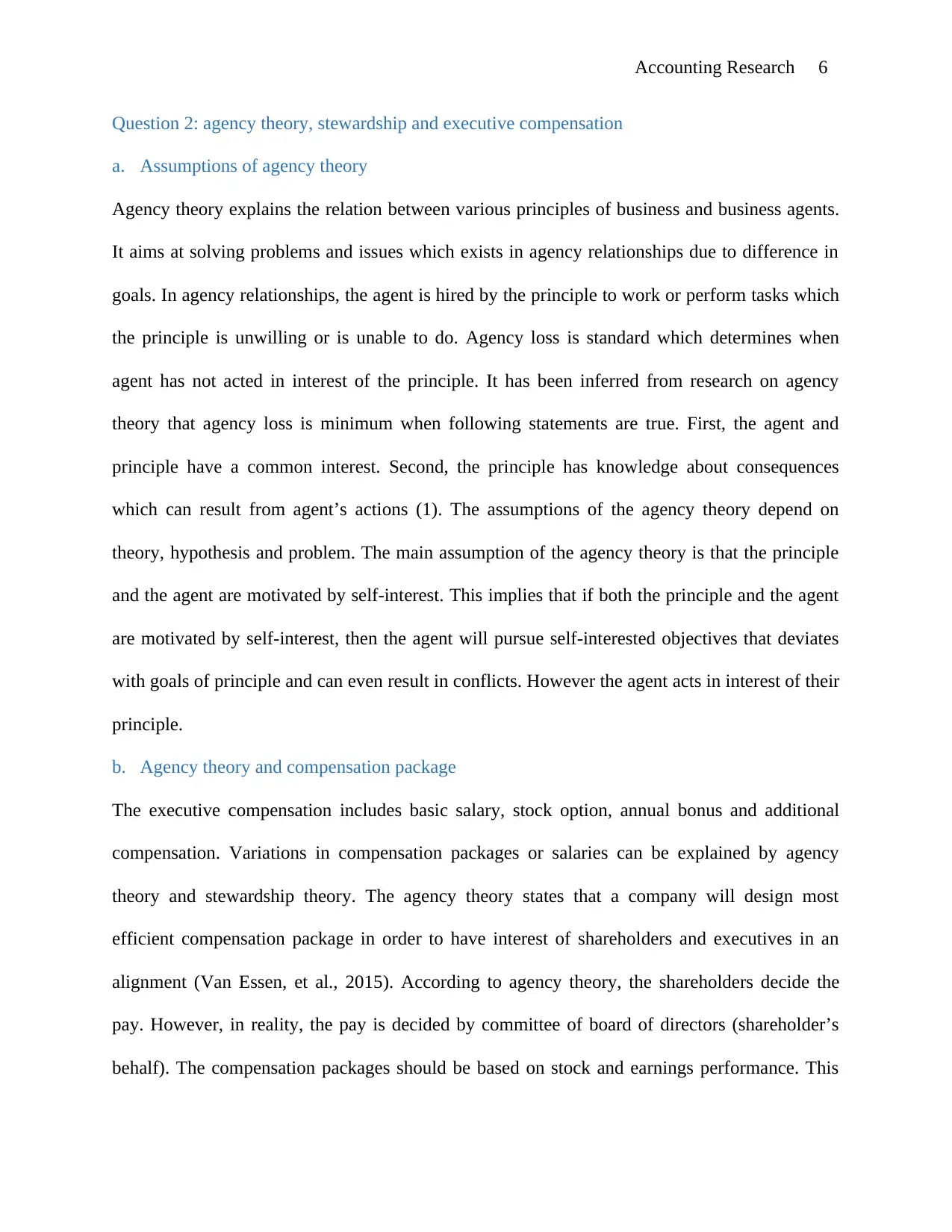
Accounting Research 6
Question 2: agency theory, stewardship and executive compensation
a. Assumptions of agency theory
Agency theory explains the relation between various principles of business and business agents.
It aims at solving problems and issues which exists in agency relationships due to difference in
goals. In agency relationships, the agent is hired by the principle to work or perform tasks which
the principle is unwilling or is unable to do. Agency loss is standard which determines when
agent has not acted in interest of the principle. It has been inferred from research on agency
theory that agency loss is minimum when following statements are true. First, the agent and
principle have a common interest. Second, the principle has knowledge about consequences
which can result from agent’s actions (1). The assumptions of the agency theory depend on
theory, hypothesis and problem. The main assumption of the agency theory is that the principle
and the agent are motivated by self-interest. This implies that if both the principle and the agent
are motivated by self-interest, then the agent will pursue self-interested objectives that deviates
with goals of principle and can even result in conflicts. However the agent acts in interest of their
principle.
b. Agency theory and compensation package
The executive compensation includes basic salary, stock option, annual bonus and additional
compensation. Variations in compensation packages or salaries can be explained by agency
theory and stewardship theory. The agency theory states that a company will design most
efficient compensation package in order to have interest of shareholders and executives in an
alignment (Van Essen, et al., 2015). According to agency theory, the shareholders decide the
pay. However, in reality, the pay is decided by committee of board of directors (shareholder’s
behalf). The compensation packages should be based on stock and earnings performance. This
Question 2: agency theory, stewardship and executive compensation
a. Assumptions of agency theory
Agency theory explains the relation between various principles of business and business agents.
It aims at solving problems and issues which exists in agency relationships due to difference in
goals. In agency relationships, the agent is hired by the principle to work or perform tasks which
the principle is unwilling or is unable to do. Agency loss is standard which determines when
agent has not acted in interest of the principle. It has been inferred from research on agency
theory that agency loss is minimum when following statements are true. First, the agent and
principle have a common interest. Second, the principle has knowledge about consequences
which can result from agent’s actions (1). The assumptions of the agency theory depend on
theory, hypothesis and problem. The main assumption of the agency theory is that the principle
and the agent are motivated by self-interest. This implies that if both the principle and the agent
are motivated by self-interest, then the agent will pursue self-interested objectives that deviates
with goals of principle and can even result in conflicts. However the agent acts in interest of their
principle.
b. Agency theory and compensation package
The executive compensation includes basic salary, stock option, annual bonus and additional
compensation. Variations in compensation packages or salaries can be explained by agency
theory and stewardship theory. The agency theory states that a company will design most
efficient compensation package in order to have interest of shareholders and executives in an
alignment (Van Essen, et al., 2015). According to agency theory, the shareholders decide the
pay. However, in reality, the pay is decided by committee of board of directors (shareholder’s
behalf). The compensation packages should be based on stock and earnings performance. This
⊘ This is a preview!⊘
Do you want full access?
Subscribe today to unlock all pages.

Trusted by 1+ million students worldwide
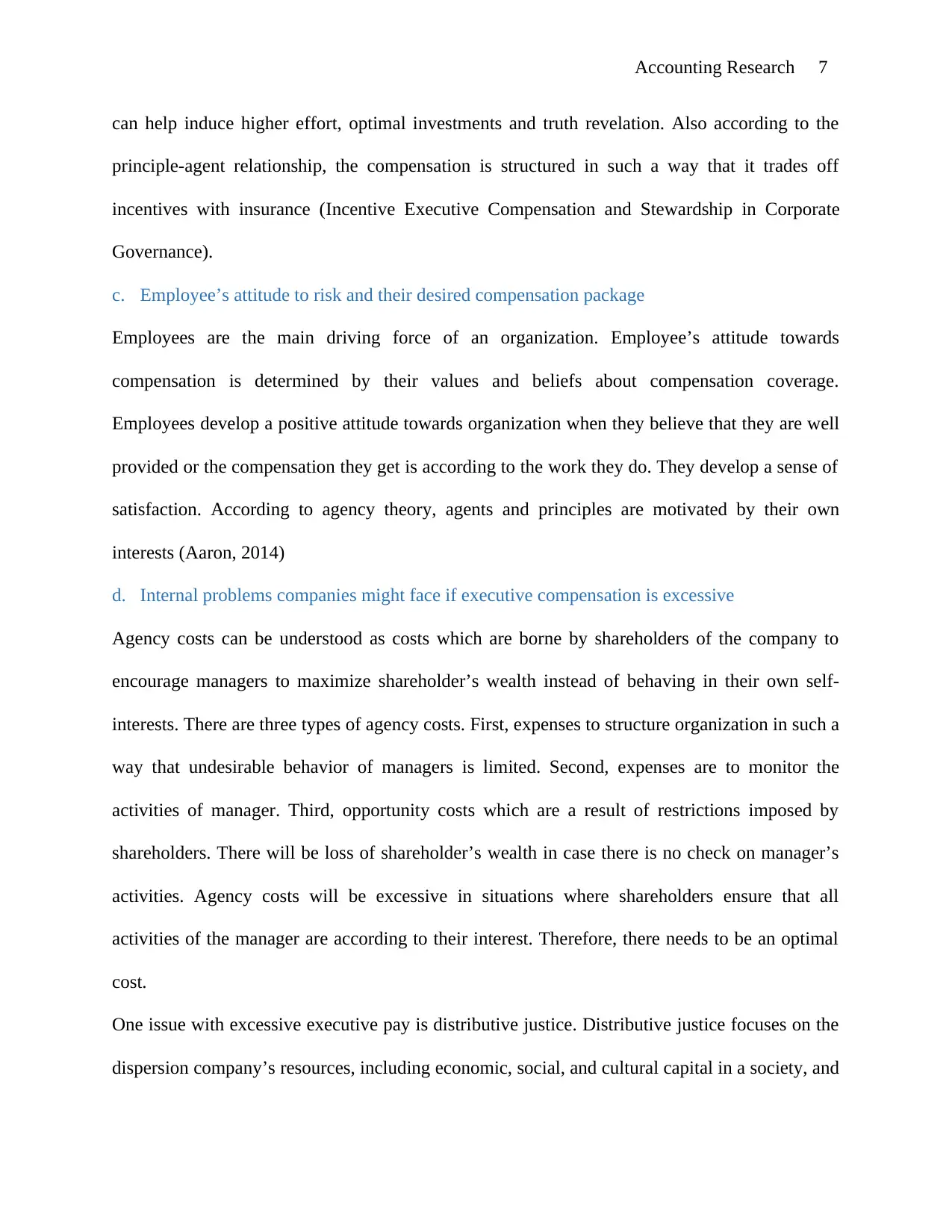
Accounting Research 7
can help induce higher effort, optimal investments and truth revelation. Also according to the
principle-agent relationship, the compensation is structured in such a way that it trades off
incentives with insurance (Incentive Executive Compensation and Stewardship in Corporate
Governance).
c. Employee’s attitude to risk and their desired compensation package
Employees are the main driving force of an organization. Employee’s attitude towards
compensation is determined by their values and beliefs about compensation coverage.
Employees develop a positive attitude towards organization when they believe that they are well
provided or the compensation they get is according to the work they do. They develop a sense of
satisfaction. According to agency theory, agents and principles are motivated by their own
interests (Aaron, 2014)
d. Internal problems companies might face if executive compensation is excessive
Agency costs can be understood as costs which are borne by shareholders of the company to
encourage managers to maximize shareholder’s wealth instead of behaving in their own self-
interests. There are three types of agency costs. First, expenses to structure organization in such a
way that undesirable behavior of managers is limited. Second, expenses are to monitor the
activities of manager. Third, opportunity costs which are a result of restrictions imposed by
shareholders. There will be loss of shareholder’s wealth in case there is no check on manager’s
activities. Agency costs will be excessive in situations where shareholders ensure that all
activities of the manager are according to their interest. Therefore, there needs to be an optimal
cost.
One issue with excessive executive pay is distributive justice. Distributive justice focuses on the
dispersion company’s resources, including economic, social, and cultural capital in a society, and
can help induce higher effort, optimal investments and truth revelation. Also according to the
principle-agent relationship, the compensation is structured in such a way that it trades off
incentives with insurance (Incentive Executive Compensation and Stewardship in Corporate
Governance).
c. Employee’s attitude to risk and their desired compensation package
Employees are the main driving force of an organization. Employee’s attitude towards
compensation is determined by their values and beliefs about compensation coverage.
Employees develop a positive attitude towards organization when they believe that they are well
provided or the compensation they get is according to the work they do. They develop a sense of
satisfaction. According to agency theory, agents and principles are motivated by their own
interests (Aaron, 2014)
d. Internal problems companies might face if executive compensation is excessive
Agency costs can be understood as costs which are borne by shareholders of the company to
encourage managers to maximize shareholder’s wealth instead of behaving in their own self-
interests. There are three types of agency costs. First, expenses to structure organization in such a
way that undesirable behavior of managers is limited. Second, expenses are to monitor the
activities of manager. Third, opportunity costs which are a result of restrictions imposed by
shareholders. There will be loss of shareholder’s wealth in case there is no check on manager’s
activities. Agency costs will be excessive in situations where shareholders ensure that all
activities of the manager are according to their interest. Therefore, there needs to be an optimal
cost.
One issue with excessive executive pay is distributive justice. Distributive justice focuses on the
dispersion company’s resources, including economic, social, and cultural capital in a society, and
Paraphrase This Document
Need a fresh take? Get an instant paraphrase of this document with our AI Paraphraser
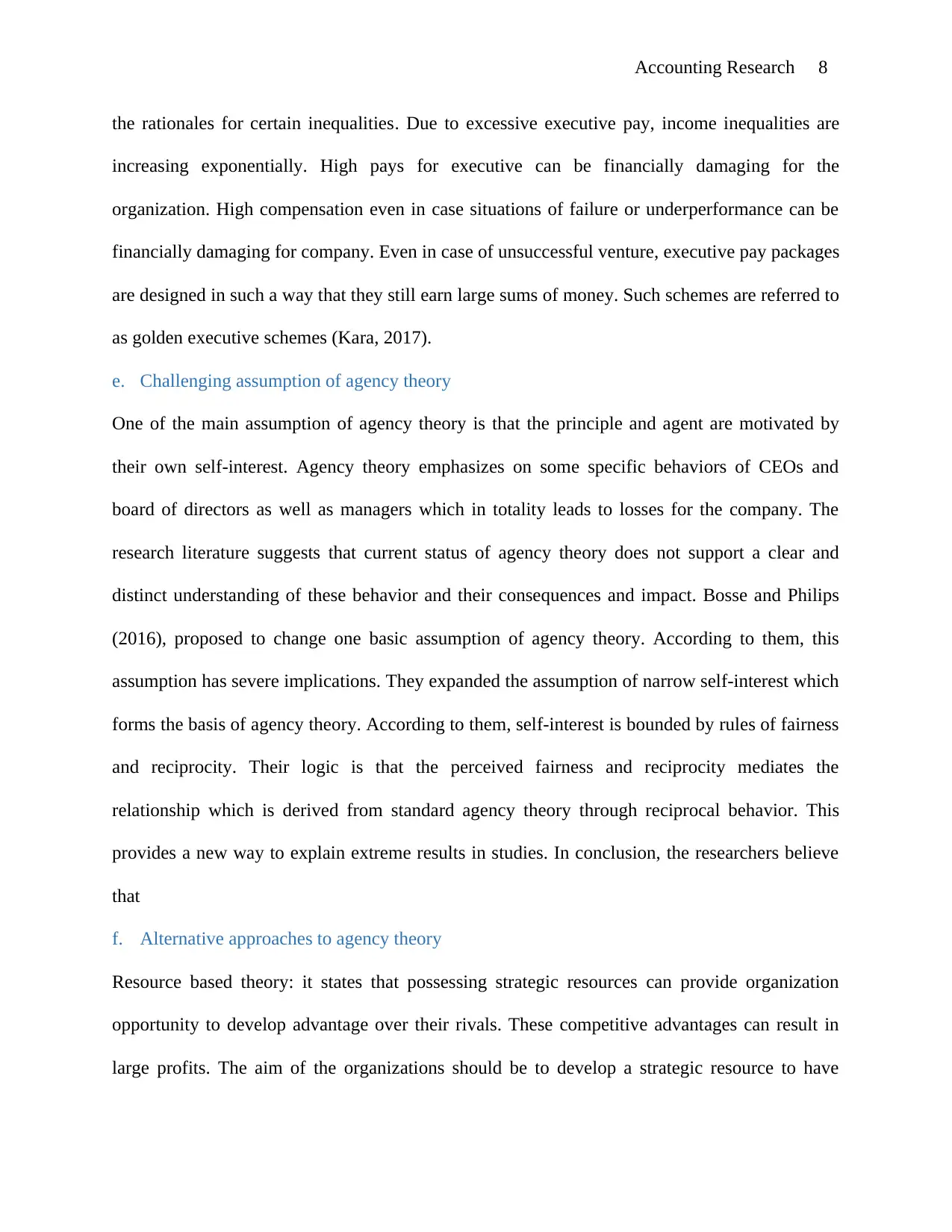
Accounting Research 8
the rationales for certain inequalities. Due to excessive executive pay, income inequalities are
increasing exponentially. High pays for executive can be financially damaging for the
organization. High compensation even in case situations of failure or underperformance can be
financially damaging for company. Even in case of unsuccessful venture, executive pay packages
are designed in such a way that they still earn large sums of money. Such schemes are referred to
as golden executive schemes (Kara, 2017).
e. Challenging assumption of agency theory
One of the main assumption of agency theory is that the principle and agent are motivated by
their own self-interest. Agency theory emphasizes on some specific behaviors of CEOs and
board of directors as well as managers which in totality leads to losses for the company. The
research literature suggests that current status of agency theory does not support a clear and
distinct understanding of these behavior and their consequences and impact. Bosse and Philips
(2016), proposed to change one basic assumption of agency theory. According to them, this
assumption has severe implications. They expanded the assumption of narrow self-interest which
forms the basis of agency theory. According to them, self-interest is bounded by rules of fairness
and reciprocity. Their logic is that the perceived fairness and reciprocity mediates the
relationship which is derived from standard agency theory through reciprocal behavior. This
provides a new way to explain extreme results in studies. In conclusion, the researchers believe
that
f. Alternative approaches to agency theory
Resource based theory: it states that possessing strategic resources can provide organization
opportunity to develop advantage over their rivals. These competitive advantages can result in
large profits. The aim of the organizations should be to develop a strategic resource to have
the rationales for certain inequalities. Due to excessive executive pay, income inequalities are
increasing exponentially. High pays for executive can be financially damaging for the
organization. High compensation even in case situations of failure or underperformance can be
financially damaging for company. Even in case of unsuccessful venture, executive pay packages
are designed in such a way that they still earn large sums of money. Such schemes are referred to
as golden executive schemes (Kara, 2017).
e. Challenging assumption of agency theory
One of the main assumption of agency theory is that the principle and agent are motivated by
their own self-interest. Agency theory emphasizes on some specific behaviors of CEOs and
board of directors as well as managers which in totality leads to losses for the company. The
research literature suggests that current status of agency theory does not support a clear and
distinct understanding of these behavior and their consequences and impact. Bosse and Philips
(2016), proposed to change one basic assumption of agency theory. According to them, this
assumption has severe implications. They expanded the assumption of narrow self-interest which
forms the basis of agency theory. According to them, self-interest is bounded by rules of fairness
and reciprocity. Their logic is that the perceived fairness and reciprocity mediates the
relationship which is derived from standard agency theory through reciprocal behavior. This
provides a new way to explain extreme results in studies. In conclusion, the researchers believe
that
f. Alternative approaches to agency theory
Resource based theory: it states that possessing strategic resources can provide organization
opportunity to develop advantage over their rivals. These competitive advantages can result in
large profits. The aim of the organizations should be to develop a strategic resource to have
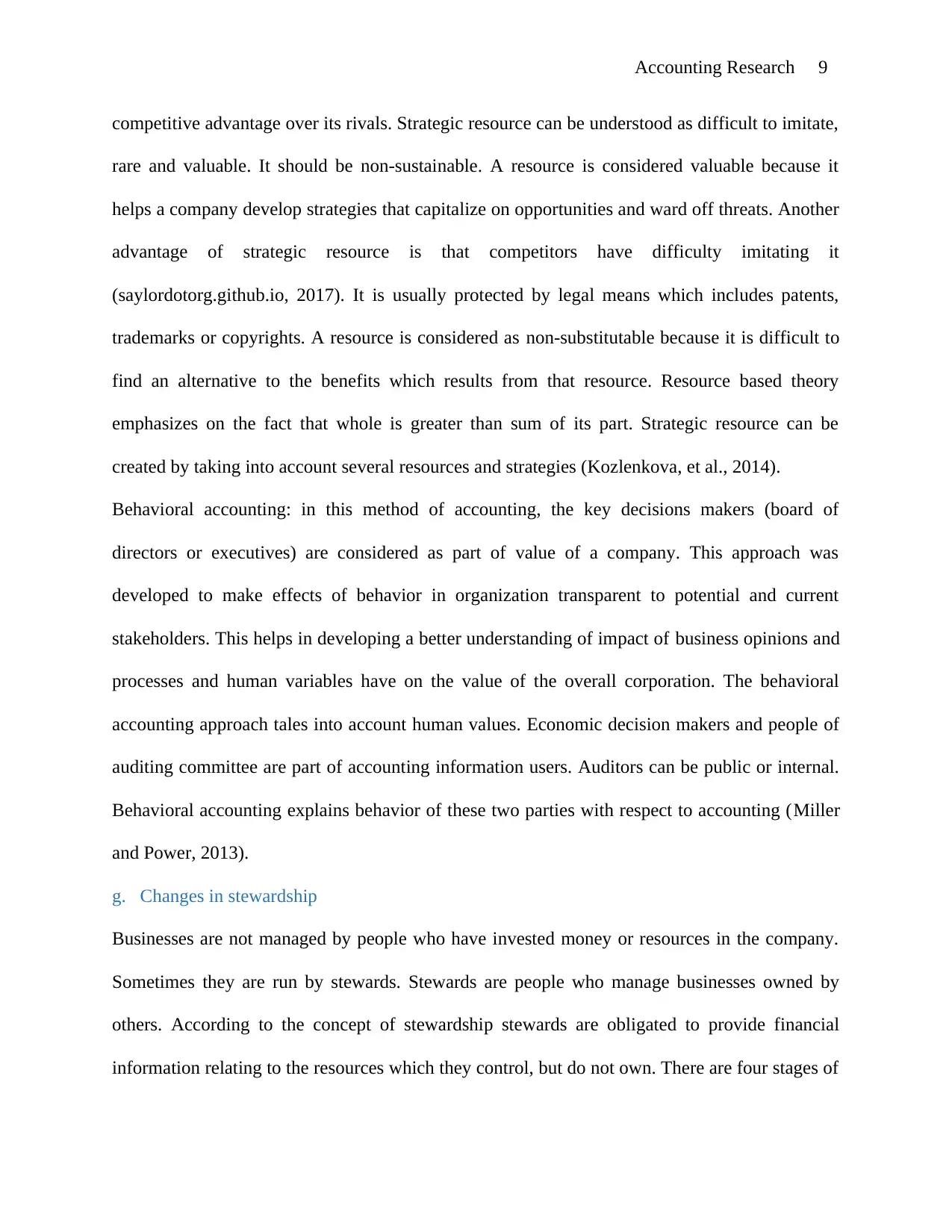
Accounting Research 9
competitive advantage over its rivals. Strategic resource can be understood as difficult to imitate,
rare and valuable. It should be non-sustainable. A resource is considered valuable because it
helps a company develop strategies that capitalize on opportunities and ward off threats. Another
advantage of strategic resource is that competitors have difficulty imitating it
(saylordotorg.github.io, 2017). It is usually protected by legal means which includes patents,
trademarks or copyrights. A resource is considered as non-substitutable because it is difficult to
find an alternative to the benefits which results from that resource. Resource based theory
emphasizes on the fact that whole is greater than sum of its part. Strategic resource can be
created by taking into account several resources and strategies (Kozlenkova, et al., 2014).
Behavioral accounting: in this method of accounting, the key decisions makers (board of
directors or executives) are considered as part of value of a company. This approach was
developed to make effects of behavior in organization transparent to potential and current
stakeholders. This helps in developing a better understanding of impact of business opinions and
processes and human variables have on the value of the overall corporation. The behavioral
accounting approach tales into account human values. Economic decision makers and people of
auditing committee are part of accounting information users. Auditors can be public or internal.
Behavioral accounting explains behavior of these two parties with respect to accounting (Miller
and Power, 2013).
g. Changes in stewardship
Businesses are not managed by people who have invested money or resources in the company.
Sometimes they are run by stewards. Stewards are people who manage businesses owned by
others. According to the concept of stewardship stewards are obligated to provide financial
information relating to the resources which they control, but do not own. There are four stages of
competitive advantage over its rivals. Strategic resource can be understood as difficult to imitate,
rare and valuable. It should be non-sustainable. A resource is considered valuable because it
helps a company develop strategies that capitalize on opportunities and ward off threats. Another
advantage of strategic resource is that competitors have difficulty imitating it
(saylordotorg.github.io, 2017). It is usually protected by legal means which includes patents,
trademarks or copyrights. A resource is considered as non-substitutable because it is difficult to
find an alternative to the benefits which results from that resource. Resource based theory
emphasizes on the fact that whole is greater than sum of its part. Strategic resource can be
created by taking into account several resources and strategies (Kozlenkova, et al., 2014).
Behavioral accounting: in this method of accounting, the key decisions makers (board of
directors or executives) are considered as part of value of a company. This approach was
developed to make effects of behavior in organization transparent to potential and current
stakeholders. This helps in developing a better understanding of impact of business opinions and
processes and human variables have on the value of the overall corporation. The behavioral
accounting approach tales into account human values. Economic decision makers and people of
auditing committee are part of accounting information users. Auditors can be public or internal.
Behavioral accounting explains behavior of these two parties with respect to accounting (Miller
and Power, 2013).
g. Changes in stewardship
Businesses are not managed by people who have invested money or resources in the company.
Sometimes they are run by stewards. Stewards are people who manage businesses owned by
others. According to the concept of stewardship stewards are obligated to provide financial
information relating to the resources which they control, but do not own. There are four stages of
⊘ This is a preview!⊘
Do you want full access?
Subscribe today to unlock all pages.

Trusted by 1+ million students worldwide

Accounting Research 10
stewardship development like Stewardship as accounting, stewardship as sustainability,
stewardship as growth and stewardship as optimization.
stewardship development like Stewardship as accounting, stewardship as sustainability,
stewardship as growth and stewardship as optimization.
Paraphrase This Document
Need a fresh take? Get an instant paraphrase of this document with our AI Paraphraser
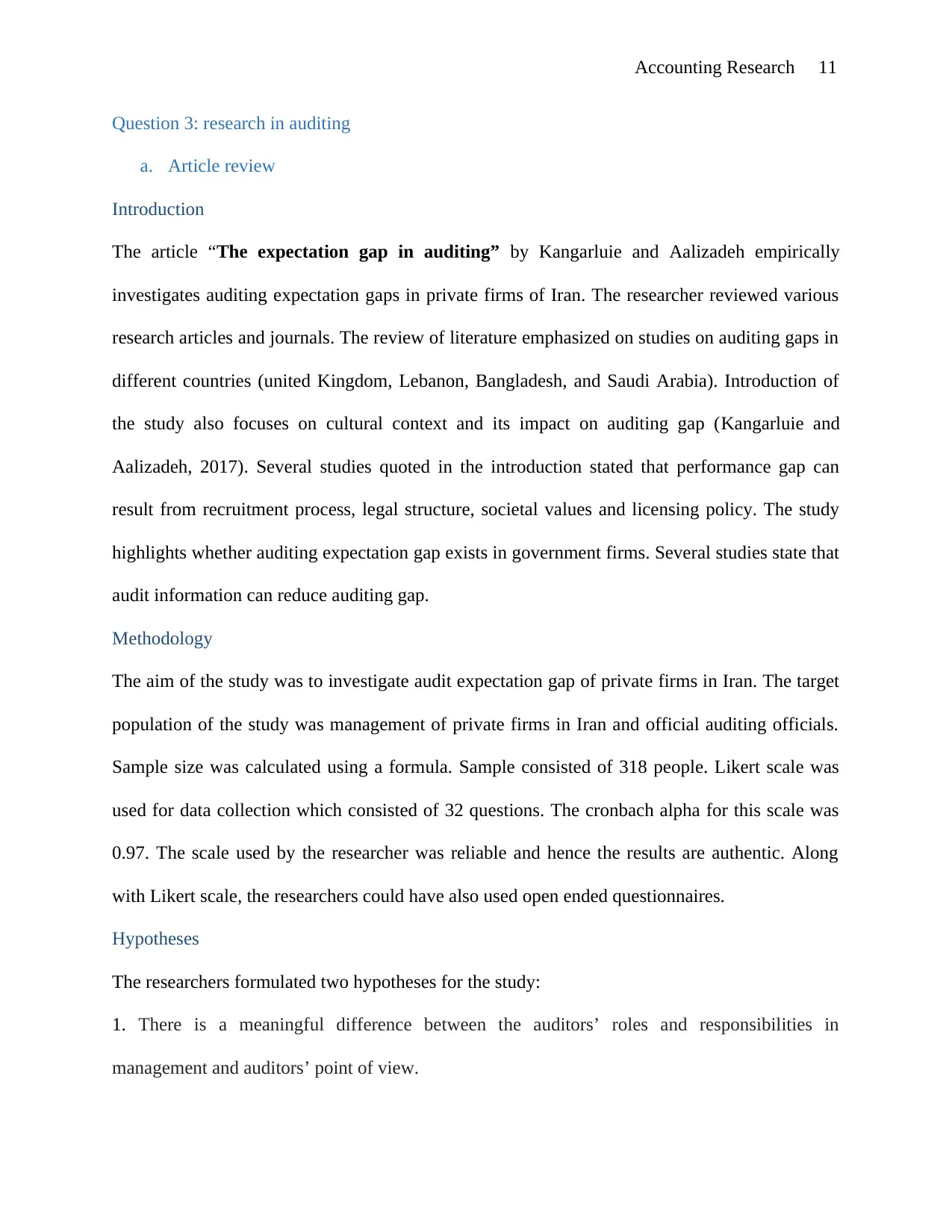
Accounting Research 11
Question 3: research in auditing
a. Article review
Introduction
The article “The expectation gap in auditing” by Kangarluie and Aalizadeh empirically
investigates auditing expectation gaps in private firms of Iran. The researcher reviewed various
research articles and journals. The review of literature emphasized on studies on auditing gaps in
different countries (united Kingdom, Lebanon, Bangladesh, and Saudi Arabia). Introduction of
the study also focuses on cultural context and its impact on auditing gap (Kangarluie and
Aalizadeh, 2017). Several studies quoted in the introduction stated that performance gap can
result from recruitment process, legal structure, societal values and licensing policy. The study
highlights whether auditing expectation gap exists in government firms. Several studies state that
audit information can reduce auditing gap.
Methodology
The aim of the study was to investigate audit expectation gap of private firms in Iran. The target
population of the study was management of private firms in Iran and official auditing officials.
Sample size was calculated using a formula. Sample consisted of 318 people. Likert scale was
used for data collection which consisted of 32 questions. The cronbach alpha for this scale was
0.97. The scale used by the researcher was reliable and hence the results are authentic. Along
with Likert scale, the researchers could have also used open ended questionnaires.
Hypotheses
The researchers formulated two hypotheses for the study:
1. There is a meaningful difference between the auditors’ roles and responsibilities in
management and auditors’ point of view.
Question 3: research in auditing
a. Article review
Introduction
The article “The expectation gap in auditing” by Kangarluie and Aalizadeh empirically
investigates auditing expectation gaps in private firms of Iran. The researcher reviewed various
research articles and journals. The review of literature emphasized on studies on auditing gaps in
different countries (united Kingdom, Lebanon, Bangladesh, and Saudi Arabia). Introduction of
the study also focuses on cultural context and its impact on auditing gap (Kangarluie and
Aalizadeh, 2017). Several studies quoted in the introduction stated that performance gap can
result from recruitment process, legal structure, societal values and licensing policy. The study
highlights whether auditing expectation gap exists in government firms. Several studies state that
audit information can reduce auditing gap.
Methodology
The aim of the study was to investigate audit expectation gap of private firms in Iran. The target
population of the study was management of private firms in Iran and official auditing officials.
Sample size was calculated using a formula. Sample consisted of 318 people. Likert scale was
used for data collection which consisted of 32 questions. The cronbach alpha for this scale was
0.97. The scale used by the researcher was reliable and hence the results are authentic. Along
with Likert scale, the researchers could have also used open ended questionnaires.
Hypotheses
The researchers formulated two hypotheses for the study:
1. There is a meaningful difference between the auditors’ roles and responsibilities in
management and auditors’ point of view.
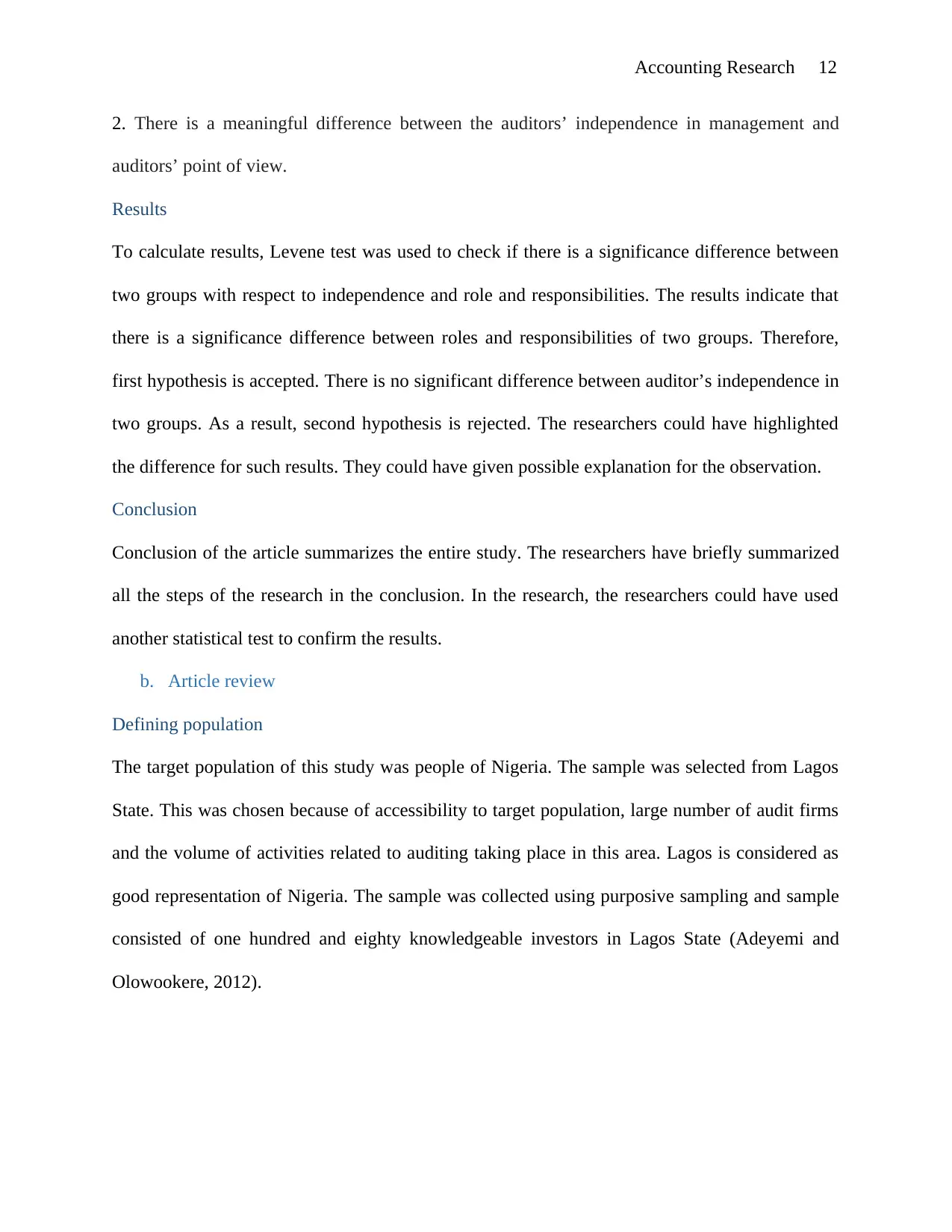
Accounting Research 12
2. There is a meaningful difference between the auditors’ independence in management and
auditors’ point of view.
Results
To calculate results, Levene test was used to check if there is a significance difference between
two groups with respect to independence and role and responsibilities. The results indicate that
there is a significance difference between roles and responsibilities of two groups. Therefore,
first hypothesis is accepted. There is no significant difference between auditor’s independence in
two groups. As a result, second hypothesis is rejected. The researchers could have highlighted
the difference for such results. They could have given possible explanation for the observation.
Conclusion
Conclusion of the article summarizes the entire study. The researchers have briefly summarized
all the steps of the research in the conclusion. In the research, the researchers could have used
another statistical test to confirm the results.
b. Article review
Defining population
The target population of this study was people of Nigeria. The sample was selected from Lagos
State. This was chosen because of accessibility to target population, large number of audit firms
and the volume of activities related to auditing taking place in this area. Lagos is considered as
good representation of Nigeria. The sample was collected using purposive sampling and sample
consisted of one hundred and eighty knowledgeable investors in Lagos State (Adeyemi and
Olowookere, 2012).
2. There is a meaningful difference between the auditors’ independence in management and
auditors’ point of view.
Results
To calculate results, Levene test was used to check if there is a significance difference between
two groups with respect to independence and role and responsibilities. The results indicate that
there is a significance difference between roles and responsibilities of two groups. Therefore,
first hypothesis is accepted. There is no significant difference between auditor’s independence in
two groups. As a result, second hypothesis is rejected. The researchers could have highlighted
the difference for such results. They could have given possible explanation for the observation.
Conclusion
Conclusion of the article summarizes the entire study. The researchers have briefly summarized
all the steps of the research in the conclusion. In the research, the researchers could have used
another statistical test to confirm the results.
b. Article review
Defining population
The target population of this study was people of Nigeria. The sample was selected from Lagos
State. This was chosen because of accessibility to target population, large number of audit firms
and the volume of activities related to auditing taking place in this area. Lagos is considered as
good representation of Nigeria. The sample was collected using purposive sampling and sample
consisted of one hundred and eighty knowledgeable investors in Lagos State (Adeyemi and
Olowookere, 2012).
⊘ This is a preview!⊘
Do you want full access?
Subscribe today to unlock all pages.

Trusted by 1+ million students worldwide
1 out of 18
Related Documents
Your All-in-One AI-Powered Toolkit for Academic Success.
+13062052269
info@desklib.com
Available 24*7 on WhatsApp / Email
![[object Object]](/_next/static/media/star-bottom.7253800d.svg)
Unlock your academic potential
Copyright © 2020–2026 A2Z Services. All Rights Reserved. Developed and managed by ZUCOL.




